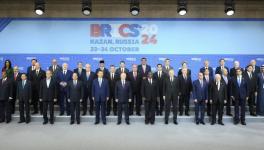Structural Issues Behind British Soap Opera
Image Courtesy: Flickr
One would think that a ‘post-truth world’ means multiple versions of the truth. When Liz Truss on October 20 said that she is “a fighter, not a quitter” in Parliament and resigned less than 24 hours later as United Kingdom’s (UK) Prime Minister (PM), one wondered whether it meant the opposite of the truth itself.
Britain has prided itself on stability—a keyword designed to manage perceptions in an era of increased media scrutiny. After the 2017 General Election when the Labour Party’s left-wing leader Jeremy Corbyn nearly became PM despite predictions and universal hostility from the establishment and much of the media, the Financial Times wrote: “The most stable of democracies has become the western world’s box of surprises.” By those standards, Britain in 2022 is looking like a post-crash black box.
While there are structural reasons for the political and economic crisis, the immediate unfolding catastrophe was kickstarted by Truss’s decisions since the very start of her premiership. She started out as an activist of the Liberal Democrats in her student days and is remembered for a speech calling for the total abolition of the British monarchy. While she did not hesitate to embrace radical ideas, the ideological pendulum shifted violently from left to right when she joined the Conservative Party.
The roots of Truss’s recent decisions lay in the fact that she identified with the ultra-right wing of her party, which wanted almost no regulations on big business, a premium on labour laws and working conditions to enhance ‘competitiveness’ (she is learnt to have called British workers “idlers” for refusing to work long hours for low pay) and most importantly, tax cuts.
The theoretical position that underpins this argument is that cutting taxes allows all people to keep more of what they earn. In practical terms, it always favours the richest as they would be paying more tax while commoners see a reduction in public services like health and education.
After Boris Johnson’s unceremonious ouster, the Tory leadership election became mostly about taxes. Truss railed against former chancellor Rishi Sunak, who had raised taxes—inevitable due to increased government borrowing and spending because of COVID-19. She thought that taxing big corporations deterred them from investing and creating more jobs, which would have led to more economic growth—in sum, the famous ‘trickledown’ theory, wherein increasing the wealth of the rich somehow magically transports it to the rest of the population.
The Indian media had hyped up Sunak’s chances because of his Indian origins while ignoring that opinion polls among Conservative Party members always favoured Truss. In the event, Sunak did better than expected as people began to realise that Truss’s flight of ‘fantasy economics’ could soon crash into the ground. But the British establishment and the public would have scarcely hoped for the unmitigated chaos that unfolded.
Truss, in her determination to immediately kickstart economic growth, appointed her ideological allies into the Cabinet while ignoring more pragmatic MPs. Her finance minister and long-time friend Kwasi Kwarteng delivered a ‘mini-Budget’ on September 23—a precursor to a full Budget in which he promised £45 billion of tax cuts mostly to big corporations and the wealthiest.
The tax cuts were to be funded by government borrowing from the markets. The British financial markets, supported by international agencies like the World Bank and International Monetary Fund, have always insisted that government debt cannot massively exceed government revenues, which is exactly what the mini-Budget did.
Britain has been in the grip of a worldwide recession and inflation caused by factors such as the Russia-Ukraine War. The markets saw the government’s policy as increasing inflation and all hell broke loose. The British pound, which has always been more in value than the dollar, was on the verge of coming down to equal value and even depreciating.
The massive inflation caused already rising prices of essential goods to rise even more, and the interest rates on home loans increased within days, causing misery to middle-income families and derailing the aspirations of prospective homebuyers.
All this was followed by political instability. Opinion polls show that if an election were held now, the opposition Labour Party may win more than 50% of the vote—an electoral landslide which has never been recorded in the era of free and fair elections.
Predictably, MPs of her own party turned upon Truss. She had to ask Kwarteng to resign. His successor, Jeremy Hunt is the fourth finance minister in four months. And then Suella Braverman resigned—the shortest-serving home secretary since 1834. The final straw came with reports of Tory MPs being bullied and manhandled to force them to vote with the government on fracking.
In her 45 days of premiership, Truss had to reverse every bit of her policy on which she had won the election of the Conservative party leadership. ‘Collapsing at the first sound of gunfire’ is an appropriate metaphor.
The crisis in British politics however is more deep rooted. The last six years have seen three PMs and six finance ministers. These are the symptoms of a larger malaise—Britain has failed to reckon with the reality that it is no longer an empire or even a prominent economic power.
Economic growth, the dream which Truss tried to sell, has not really picked up since the 2008 financial crisis, which was caused by the recklessness of rich bankers who thrived on trading stocks. The government, already comprising politicians formerly employed by many of these big businesses and shady hedge funds, chose to cut budgets of key departments like health, education, etc.
This period of ‘austerity’ did not help growth. Since the days of Margaret Thatcher, the UK has destroyed its own manufacturing. The integration into the European Union (EU) helped create a ‘single market’ where British stock brokers and hedge funds could sell their ‘services’ in exchange for tariff-free European goods and cheap labour from former Soviet-bloc countries.
However, the ‘empire nostalgic’ right of the Conservative party hoped that it would be easier for big business if Britain was not in the EU. Millions of working people in former industrial towns left to rot by neglect and austerity responded by doing the opposite of what the establishment wanted— taking Britain out of the EU.
Brexit may have been driven by popular anger but its narrative had been captured by ideological currents from which Truss came—they dreamt of immediately being able to sign free trade deals with other countries, and also control migration in tune with the demands of an increasingly vocal racist section.
None of this came to fruition. Even Britain’s closest ally, the US, has refused to sign a free trade deal. As Braverman found out that the UK cannot have free trade deals with India and still restrict migration.
While the British establishment would have never wanted a mediocre like Truss, they have failed to stop the rot and this game of musical chairs simply because years of policies favouring the rich together with a volatile world situation is throwing up these unpredictable situations.
While the soap opera goes continues at Westminster, British people do not have the luxury to watch. According to Hunt, every department will have to see more fund cuts as a result of Truss’s guinea pig experiments with the economy.
The country has prided itself on its National Health Service (NHS) being free and funded by the taxpayer to provide universal care irrespective of your ability to pay. Cuts to NHS budgets led to hundreds of thousands of deaths during the pandemic. With more austerity may come the grim spectacle of more people dying while waiting for an ambulance and endless wait for operations and even for a doctor to examine.
The war in Ukraine has triggered a rise in oil prices and the cost of essential commodities is increasing. In the cold harsh climate of the UK, heating homes in winter is difficult if fuel is expensive. Truss had announced a freeze on fuel bills for two years but Hunt has made her retreat and people might see a mammoth increase after April.
Agitated workers are now going on strike as they are not paid in line with inflation. Agitated protestors against climate change are using increasingly disruptive protests such as blocking roads and gluing themselves to things as temperatures in the UK reach 40°C. Agitated racists and reactionaries want Britain to stop all migration. Even symbolic stability, embodied by the longest reigning head of the state, is gone after the death of Queen Elizabeth II within two days of confirming Truss as her 15th PM. Now, King Charles III will appoint his first PM and Britain’s fifth in six years.
The writer is a research scholar in media studies at the Jawaharlal Nehru University.
Get the latest reports & analysis with people's perspective on Protests, movements & deep analytical videos, discussions of the current affairs in your Telegram app. Subscribe to NewsClick's Telegram channel & get Real-Time updates on stories, as they get published on our website.
























